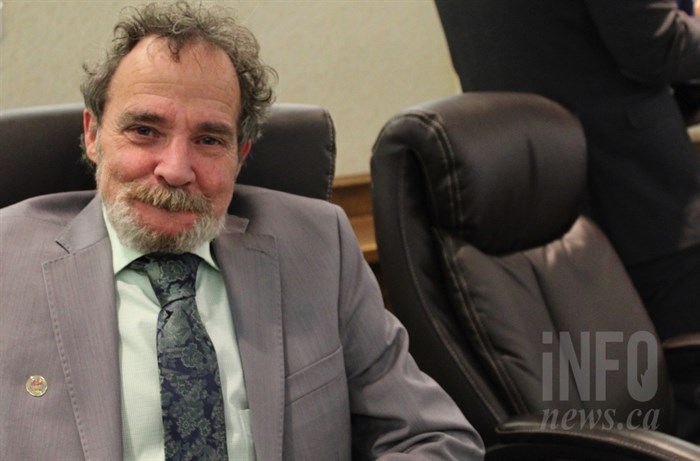
Kelowna Coun. Charlie Hodge.
(ROB MUNRO / iNFOnews.ca)
June 20, 2019 - 4:00 PM
KELOWNA - Dealing with crime and homelessness on city streets – and the criticism for not doing enough - is starting to sit heavily on some Kelowna politician’s shoulders.
Earlier this week, Mayor Colin Basran called for an end to complaints about supportive housing.
At an earlier council meeting, Coun. Charlie Hodge and Luke Stack suggested some of the worst offenders be forced into treatment. Those comments came during a meeting with Interior Health officials who said such a move may violate people’s human rights.
“We have to look at whether or not – it’s not a proper thought but it’s the reality of what we’re dealing with - do we have to look at some line where there is incarceration, because of their addiction or because of their mental state of health,” Hodge said in an interview with iNFOnews.ca.
“As a municipality, we’ve done everything we can possibly do,” he said. “Someone has to have the intestinal fortitude to step up to plate.”
By “someone” he means the federal and provincial governments.
That thought was echoed by Coun. Mohini Singh at this week’s council meeting when she talked about the provincial government knowing there would be problems when they closed the Riverview mental health institution in 2012.
And Coun. Luke Stack, during the meeting with Interior Health, noted that, if people have dementia, they can be forced into care, but not the roughly 60 people on Kelowna streets who are “getting into a lot of trouble.”
Some of those statements follow from comments Journey Home executive director Gaelene Askeland made to council on April 15. She said there are 50 to 70 people in Kelowna with severe behavioural problems who don’t fit into the current treatment and housing models.
They’re too disruptive to live in the supportive housing Basran told residents to stop complaining about. They need specialized, intensive care in smaller homes – something that’s just not available in B.C.
“There are 50 or 60 of them who live on our streets who are never going to live on their own, capably,” Hodge said. “Without proper intervention and help, it’s going to be a rotating door. We’re never going to solve the problems downtown if those people remain in the downtown. And moving them somewhere else, all you’re doing is moving the problem."
“It comes to a point where, OK, so we arrest this guy 60 times. Ether you stop arresting him and wait for him to die or move along or whatever. It comes to the point where you have to say this is ridiculous.”
He pointed to a lack of drug treatment and rehabilitation facilities as one area where senior governments need to step up their efforts.
For him, housing is no longer an issue with about 230 supportive housing units either open or in the works. Attention needs to be focused on this highly visible group of disruptive people, he said.
“As a city councillor, I hear the concerns and frustrations (of residents and business owners),” he said. “Believe me, they’re our concerns and frustrations too. We’re fed up with it. We want to make a difference. We’re trying to help, but we can’t do it alone.”
To contact a reporter for this story, email Rob Munro or call 250-808-0143 or email the editor. You can also submit photos, videos or news tips to the newsroom and be entered to win a monthly prize draw.
We welcome your comments and opinions on our stories but play nice. We won't censor or delete comments unless they contain off-topic statements or links, unnecessary vulgarity, false facts, spam or obviously fake profiles. If you have any concerns about what you see in comments, email the editor in the link above.
News from © iNFOnews, 2019